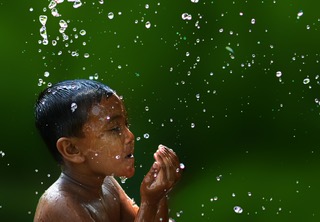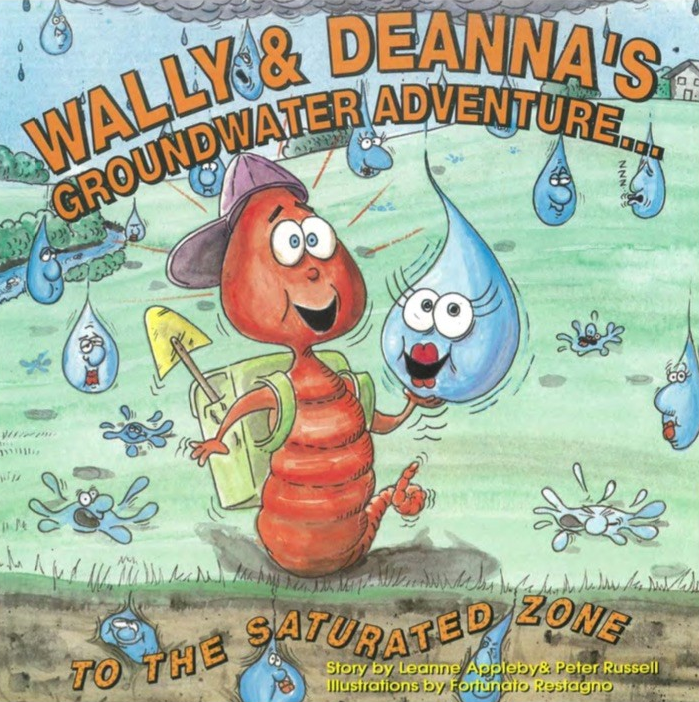
While adults may think of themselves as the custodians of groundwater, it is children who are the true guardians of water. They are the ones who will take action for the conservation of groundwater in the future! Perhaps our greatest responsibility as adults is to inspire an interest in groundwater in children and adolescents. This is challenging because groundwater is still far from being understood by everyone (apart from experts), perhaps because it is an “invisible” resource or perhaps because we’re using outdated teaching methods, but it is necessary to make this natural resource visible.

Image source (Ritesh Arya’s photo): https://www.pexels.com/pt-br/foto/aqua-borrao-mancha-nevoa-3092648/
After all, groundwater is essential to life:
- 98% of the planet’s fresh water is groundwater
- 2.5 billion people depend solely on groundwater resources to satisfy their basic daily water needs (Groundwater Project, 2020)
- Approximately 70 percent of global groundwater withdrawals are used to grow food and industrial crops and raise livestock (Food and Agriculture Organization, 2022)
- Land subsidence (sinking) due to excessive water exploitation may affect 1.6 billion people until 2040 (Wired Magazine, 2021)
Bringing groundwater issues to children is not a simple task, but it can be achieved with creativity and persistence.
According to the Groundwater Project Blog (2021):
“The lack of materials that illustrate in a simple way the concepts related to groundwater makes it even more difficult to teach in the field, especially to children and adolescents. It is essential that we have high-quality educational materials for all to learn about the importance of groundwater.”
Playful activities advance learning, arouse curiosity and stimulate the desire to know the world.
3 tips for teaching kids about groundwater:
1) Watch educational animated videos with your children. They are excellent ways to spark imagination, as well as create awareness of issues relevant to the planet. It can start in childhood! The Groundwater Project in partnership with Instituto Água Sustentável (Sustainable Water Institute) has a social media program called “Ask Professor Água” that answers questions about groundwater asked by children from around the world! Digital media has enormous power and we can use it to promote information about groundwater for children.
There are videos in Portuguese, English, Spanish and Arabic. This encourages learning and, perhaps most importantly, creates belonging to a cause from childhood. Visit our YouTube channel and watch more videos. Don’t forget to subscribe and hit the like button if you enjoy The Groundwater Project’s work.
2) Read books that talk about groundwater. Encourage kids to have contact with these types of books. Even with limited understanding, children can acquire an essential habit for their development.

You can download Wally & Deanna’s Groundwater Adventure to the Saturated zone in English, Spanish, Greek, Chinese, French, Indonesian, Hausa, Hungarian, Afrikaans and Urdu. At this link: https://gw-project.org/books/wally-and-deannas-groundwater-adventure-to-the-saturated-zone/
3) Participate in outdoor educational activities. Take time to explain where spring water comes from, describe how a well works, explain how littering can affect groundwater, and more. All of this can help children understand the impact of their actions and create a sense of responsibility.

Image source (Thanh Hue Dao’s photo): https://www.pexels.com/pt-br/foto/garotos-meninos-rapazes-infancia-9487057/
These are simple tips that anyone can use. Let’s put these suggestions into practice!
The world needs water, groundwater!
References:
Food and Agriculture Organization, 2022: https://www.fao.org/fao-stories/article/en/c/1479581/
Groundwater Project, 2020: https://gw-project.org/the-importance-of-groundwater/
Groundwater Project Blog, 2021: https://gw-project.org/the-importance-of-spreading-groundwater-knowledge/
Wired Magazine, 2021: https://www.wired.com/story/the-ongoing-collapse-of-the-worlds-aquifers/

